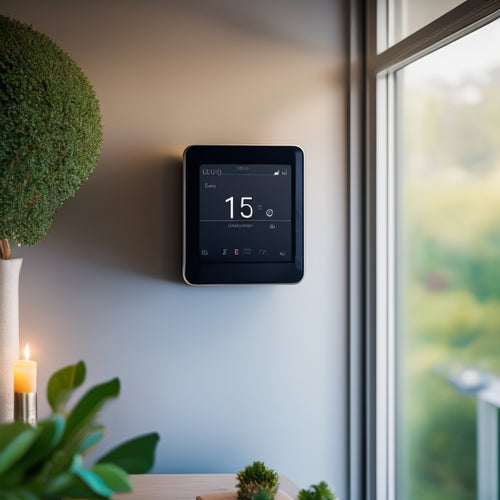
Sustainable Water Heating: Heat Pumps Vs Solar Systems
Share
You're considering sustainable water heating options, assessing heat pumps against solar systems to reduce your environmental footprint and energy bills. Both options offer benefits: heat pumps employ ambient heat for high efficiency, suitable for small households in moderate climates, while solar systems capture sunlight for ideal performance in large households with sunny climates. Efficiency metrics, such as COP and solar fraction, vary between systems, influencing energy savings and environmental impact. By examining factors like upfront costs, total ownership expenses, and maintenance needs, you'll uncover the best fit for your specific needs, and exploring these distinctions will reveal which option aligns with your sustainable goals.
Key Takeaways
- Heat pumps and solar systems offer sustainable water heating options, with heat pumps suitable for small households in moderate climates and solar systems ideal for large households in sunny climates.
- Both options provide significant energy savings, with heat pumps boasting high COPs and solar systems offering high solar fractions.
- System costs vary, with heat pumps ranging from $3,000 to $10,000 and solar systems ranging from $2,000 to $6,000, but total cost of ownership should also be considered.
- Environmental impact analysis is crucial, as both systems reduce carbon footprint and pollution, with solar systems offering a longer lifespan and lower maintenance needs.
- The best option depends on specific water heating needs, local climate conditions, and maintenance requirements, with financial incentives and energy savings potential also influencing the decision.
Understanding Heat Pump Technology
As you investigate the world of heat pump technology, it's vital to grasp the fundamental principles behind this innovative approach to water heating.
You'll find that heat pumps work by utilizing ambient heat from the air, ground, or water to warm your water supply. There are several heat pump types, including air-source, ground-source, and hybrid models, each with its advantages and limitations.
In addition, renewable energy sources like solar farms can be used to power heat pumps, further reducing greenhouse gas emissions and reliance on fossil fuels.
When it comes to system maintenance, regular checks are necessary to guarantee peak performance and efficiency. You'll need to inspect and clean the system's filters, coils, and fans, as well as monitor the refrigerant levels and electrical connections.
How Solar Water Heaters Work
Your water heating needs can be efficiently met by utilizing the sun's energy through solar water heaters. These systems use solar collectors to absorb sunlight, which heats a fluid that's then used to warm water. You can choose from two solar collector types: evacuated tube collectors and flat-plate collectors. Heat transfer methods include direct circulation, indirect circulation, and drainback systems.
| System Component | Description | Tips |
|---|---|---|
| Solar Collectors | Absorb sunlight to heat fluid | Regularly clean collectors for peak performance |
| Heat Exchangers | Transfer heat to water | Insulate pipes to minimize heat loss |
| Storage Tanks | Hold heated water for later use | Size tank according to your water heating needs |
| Controllers | Regulate temperature and system operation | Set temperature limits to prevent overheating |
Energy Efficiency Comparison
You'll want to evaluate the energy efficiency of different sustainable water heating systems to determine which one best suits your needs.
When comparing heat pump efficiency, you'll need to take into account factors such as the coefficient of performance (COP) and seasonal performance factor (SPF).
In addition, it's crucial to examine the environmental impact of your chosen system, as renewable energy sources can greatly reduce carbon footprint.
Moreover, integrating solar power can minimize reliance on fossil fuels and lower greenhouse gas emissions.
Meanwhile, solar system performance is typically measured by its solar fraction, which represents the percentage of hot water demand met by solar energy.
Heat Pump Efficiency
Heat pumps boast impressive efficiency rates when compared to traditional water heating systems, with some models capable of achieving coefficients of performance (COPs) exceeding 4.0. This means you can enjoy significant energy savings while reducing your carbon footprint.
In addition, heat pumps can be powered by renewable energy sources, such as solar-powered charging solutions, which can further minimize their environmental impact.
When selecting a heat pump, consider the following key factors:
-
Seasonal efficiency: Look for heat pumps with high seasonal COPs, which take into account the varying temperatures throughout the year.
-
Noise levels and installation locations: Consider the noise level and installation location of the heat pump, as these can impact your user experience.
-
Maintenance requirements: Opt for heat pumps with low maintenance requirements to minimize your workload and guarantee ideal performance.
Solar System Performance
When evaluating solar water heating systems, it's essential to take into account their performance regarding energy efficiency, as it directly impacts your energy savings and environmental footprint.
You'll want to take into account the solar panel efficiency, which is typically measured by its ability to convert sunlight into heat energy. A higher efficiency rating means more energy is generated per unit area.
However, seasonal performance is also vital, as it affects the system's overall energy output throughout the year.
Optimizing solar panel layout and evaluating available roof or ground space can also enhance energy production efficiency.
You'll need to assess how well the system performs during periods of low sunlight, such as winter, to guarantee it meets your hot water demands.
Cost and Installation Factors
When evaluating sustainable water heating options, you'll need to weigh upfront system costs against ongoing energy expenses.
You'll want to calculate the total cost of ownership, including installation fees, material expenses, and long-term energy savings. By analyzing these factors, you can determine which system will provide the best return on investment for your specific needs.
Additionally, it's crucial to take into account the benefits of shifting to renewable energy sources, such as reduced carbon footprint, which can lead to lower operating costs and increased property value.
Upfront System Costs
As you consider installing a sustainable water heating system, upfront costs are likely a key factor in your decision-making process.
The costs of heat pumps and solar systems vary, but both can be significant investments.
-
Heat pumps typically range from $3,000 to $10,000 or more, depending on the size and quality of the system.
-
Solar systems can cost between $2,000 and $6,000 or more, depending on the number of panels and system complexity.
You may be able to offset these costs with financing options or government incentives, such as tax credits or rebates, which can help make sustainable water heating more accessible and affordable.
Ongoing Energy Expenses
Beyond the initial investment, you'll want to evaluate the ongoing energy expenses associated with your sustainable water heating system. Ongoing expenses include energy consumption, maintenance costs, and potential repairs.
Heat pumps and solar systems have varying operational efficiencies, which impact your long-term budgeting. Heat pumps typically offer higher energy savings, but solar systems can provide more significant financial incentives, especially in regions with high utility rates.
When forecasting costs, consider the system's lifespan, expected maintenance, and potential upgrades. Accurate cost forecasting helps you make an informed decision.
Environmental Impact Analysis
In conjunction with the rising global concerns about climate change, environmental impact analysis has become a crucial aspect of sustainable water heating.
As you weigh your options, it's important to take into account the ecological consequences of your water heating system.
You'll want to evaluate how each option affects the environment, including:
- Carbon footprint and pollution reduction, which directly impact climate resilience
- Resource sustainability and ecosystem effects, ensuring the long-term health of our planet
- Community impact, as your choice can influence the availability of renewable resources for future generations
Choosing the Best Option
Your sustainable water heating system selection hinges on a thorough evaluation of available options, each with its unique benefits and drawbacks. You must carefully weigh factors like system longevity, user preferences, climatic considerations, and maintenance requirements to make an informed decision.
| System Feature | Heat Pumps | Solar Systems |
|---|---|---|
| System Longevity | 10-15 years | 20-30 years |
| User Preferences | Suitable for small households | Ideal for large households |
| Climatic Considerations | Works well in moderate climates | Performs best in sunny climates |
| Maintenance Requirements | Regular filter cleaning | Periodic panel cleaning |
Frequently Asked Questions
Can Heat Pumps Work With Existing Plumbing and Piping Systems?
You'll find that heat pumps can seamlessly integrate with your existing plumbing and piping systems, minimizing installation considerations, as long as you guarantee proper sizing and insulation to maximize energy efficiency and optimize performance.
Are Solar Water Heaters Affected by Seasonal Changes in Sunlight?
You're probably wondering if solar water heaters are crippled by seasonal changes in sunlight - and the answer is, not entirely. While solar efficiency takes a hit during winter, clever designs can mitigate this, ensuring seasonal performance remains strong, even on the gloomiest days.
Do Heat Pumps Require Regular Maintenance to Operate Efficiently?
You'll need to stick to a regular maintenance schedule to guarantee your heat pump operates at its best; follow efficiency tips like cleaning filters, checking refrigerant levels, and monitoring performance to maximize its energy-saving potential.
Can Solar Water Heaters Be Installed on Existing Roofs?
As you consider utilizing the sun's power, you'll find that solar water heaters can be installed on existing roofs, but you'll need to assess the roof's suitability and verify it meets installation requirements, such as structural integrity and sunlight exposure.
Are Heat Pumps Compatible With Radiant Floor Heating Systems?
You'll find heat pumps compatible with radiant floor heating systems, as they efficiently supply water at lower temps, optimizing radiant efficiency and heat distribution, allowing you to freely design your ideal hydronic setup.
Related Posts
-

3 Best Eco-Grants for Home Energy Upgrades
You're eligible for various eco-grants that can help you cut down on energy bills and reduce your carbon footprint by...
-

3 Sun-Powered Automated Shades for Energy-Savvy Homes
You're looking to change your home into an energy-savvy haven, and sun-powered automated shades are an essential step...
-

Smart Energy: Greener Homes With Connected Power Devices
You can control and optimize your energy consumption with smart energy devices, reducing your carbon footprint by up ...


